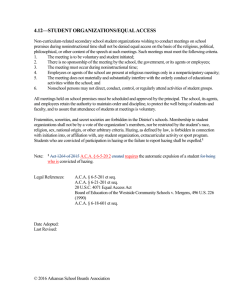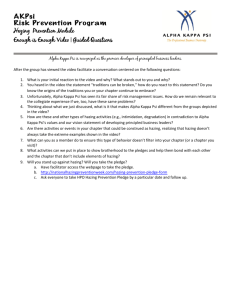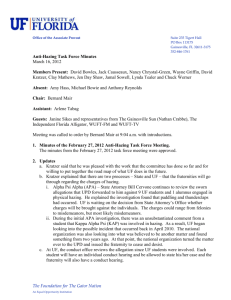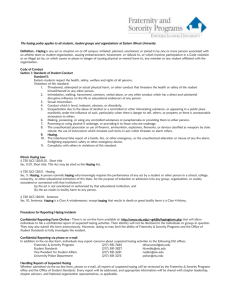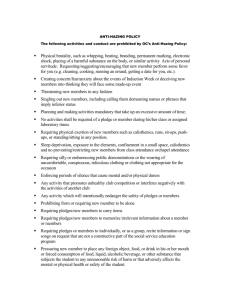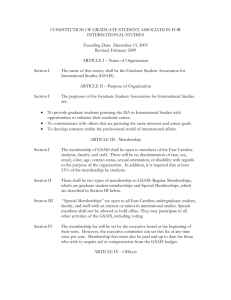WORD - Aztec Recreation Center
advertisement
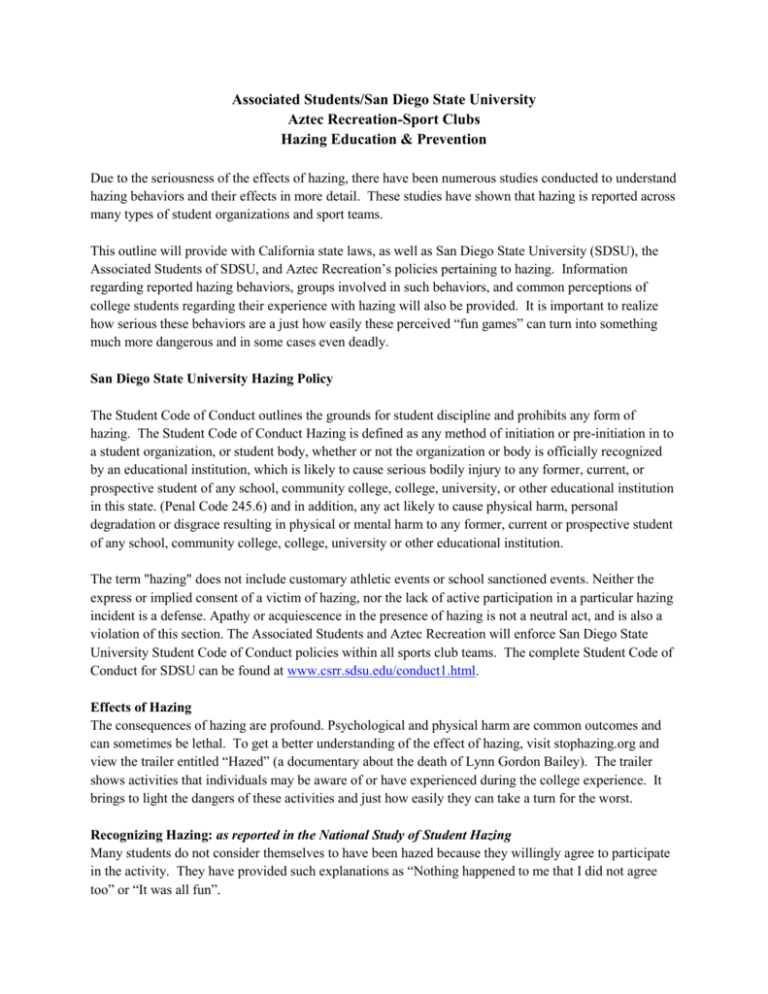
Associated Students/San Diego State University Aztec Recreation-Sport Clubs Hazing Education & Prevention Due to the seriousness of the effects of hazing, there have been numerous studies conducted to understand hazing behaviors and their effects in more detail. These studies have shown that hazing is reported across many types of student organizations and sport teams. This outline will provide with California state laws, as well as San Diego State University (SDSU), the Associated Students of SDSU, and Aztec Recreation’s policies pertaining to hazing. Information regarding reported hazing behaviors, groups involved in such behaviors, and common perceptions of college students regarding their experience with hazing will also be provided. It is important to realize how serious these behaviors are a just how easily these perceived “fun games” can turn into something much more dangerous and in some cases even deadly. San Diego State University Hazing Policy The Student Code of Conduct outlines the grounds for student discipline and prohibits any form of hazing. The Student Code of Conduct Hazing is defined as any method of initiation or pre-initiation in to a student organization, or student body, whether or not the organization or body is officially recognized by an educational institution, which is likely to cause serious bodily injury to any former, current, or prospective student of any school, community college, college, university, or other educational institution in this state. (Penal Code 245.6) and in addition, any act likely to cause physical harm, personal degradation or disgrace resulting in physical or mental harm to any former, current or prospective student of any school, community college, college, university or other educational institution. The term "hazing" does not include customary athletic events or school sanctioned events. Neither the express or implied consent of a victim of hazing, nor the lack of active participation in a particular hazing incident is a defense. Apathy or acquiescence in the presence of hazing is not a neutral act, and is also a violation of this section. The Associated Students and Aztec Recreation will enforce San Diego State University Student Code of Conduct policies within all sports club teams. The complete Student Code of Conduct for SDSU can be found at www.csrr.sdsu.edu/conduct1.html. Effects of Hazing The consequences of hazing are profound. Psychological and physical harm are common outcomes and can sometimes be lethal. To get a better understanding of the effect of hazing, visit stophazing.org and view the trailer entitled “Hazed” (a documentary about the death of Lynn Gordon Bailey). The trailer shows activities that individuals may be aware of or have experienced during the college experience. It brings to light the dangers of these activities and just how easily they can take a turn for the worst. Recognizing Hazing: as reported in the National Study of Student Hazing Many students do not consider themselves to have been hazed because they willingly agree to participate in the activity. They have provided such explanations as “Nothing happened to me that I did not agree too” or “It was all fun”. 1 in 20 students reported that they have been hazed 1 in 5 students reported experiencing specific behaviors that are considered hazing, but state that they did not consider it to be so. 40% of students who reported being involved in hazing behaviors report that a coach or advisor was aware of the activity. 22% of students report that the coach or advisor was involved in the hazing. Hazing has nothing to do with the willingness of the participant. Because an individual is willing to participate does not mean behavior is appropriate and not considered hazing. Most students fail to recognize the role of group coercion and the difficulty of truly consenting when faced with powerful peer pressure. Many students are deterred from reporting their experience to anyone because of peer reaction and/or retribution. In an individual is unsure whether an act constitutes hazing, they should ask themselves the following questions: Is this activity an educational experience or opportunity? Would you be willing to allow your parents or a University administrator to witness this activity? Is this activity that new members and current members are participating in together? Would you be able to defend this activity in a court of law? If you answered “no” to any of these questions, the activity is most likely a form of hazing. The study “National Study of Student Hazing: Examining and Transforming Campus Hazing Cultures” indicates that hazing is not a “harmless antic or prank”. From the reports gathered by those who have been victims of hazing, the following list of behaviors has been compiled. It is important to remember that this is only a partial list and by no means encompasses all hazing behaviors: Attend a skit night or roast where other members are humiliated. Sing or chant by yourself or with a few select team members in a public situation that is not related to the event, game, or practice. Wear clothing that is embarrassing and not part of the uniform. Be yelled, screamed, or cursed at by other team/organization members. Get a tattoo or pierce a body part. Act as a personal servant to other members. Deprive yourself of sleep. Be awakened at night by other members. Make prank phone calls or harass others. Be tied up, taped or confined to small spaces Be transported to and dropped off in an unfamiliar location. Endure harsh weather without the proper clothing. Drink large amounts of non-alcoholic beverages such as water. Drink large amounts of alcohol to the point of passing out or getting sick. Watch live sex acts. Perform sex acts with the same or opposite gender. How to Stop Hazing Awareness: If an individual, as a member of a sports club team, as a requirement for membership, haze another individual, you are subjecting yourself and your sports club organization to University sanctions as well as possible legal action. If you are a representative of a sports club organization you may be held accountable for the actions of other members of you sports club organization if they haze others. It is important to look for activities and comments that insinuate that a member is hazing other members of the organization. Action: Increase awareness of your sports club organization members by educating them of the dangers associated with hazing. Implement positive programming focusing on individuals’ development, educational activities, and organizational development. After a problem is found, do not overlook it. Report any incident directly to Aztec Recreation. Reporting Hazing: Here are a few of the appropriate authorities to contact when individuals suspect a form of hazing has occurred: Sports Club Coordinator-DeJuan Benford: 619-594-4280, dejuan.benford@sdsu.edu Sports Club Supervisor-Joe Schaffer: 619-594-6937, joe.schaffer@sdsu.edu Program Coordinator-Brett Kehler: 619-594-7268, brett.kehler@sdsu.edu Aztec Recreation Asst. Director- Ron Cortell: 619-594-6492, ron.cortell@sdsu.edu Aztec Recreation Director-Eric Huth: 619-594-7269, eric.huth@sdsu.edu San Diego State University Police Department: 619-594-1991 Safe Non-Hazing Activities Below is a list of activities that will create positive unity in your sports club organization: Have discussions about membership standards and expectations. Participate in a ropes course. Participate in and/or plan a community service project Attend an educational speaker and/or discussions as a group. Eat lunch/dinner together once a week. Develop a peer mentoring group. Designate study hour for all members. Have new member compete against current members. Have new members learn about the history of your organization by preparing a presentation to provide to the entire group Bibliography Allan, E.J. & Madden, M.M. (June 30, 2006). National Study of Student Hazing: Examining and Transforming Campus Hazing Cultures. pp. 1-30. http://stophazing.tamu.edu: Texas A&M University, Ways to create good membership without hazing. www.fandm.edu: Franklin and Marshall University, Stop Hazing. www.hazing.cornell.edu: Cornell University, A revealing look at hidden rites. www.nirsa.org: National Intramural Sports Association. www.purdue.edu: Purdue University, Hazing. www.temple.edu: Temple University, Campus Recreation Sport Club/Organization Meeting: Hazing Education & Prevention.
